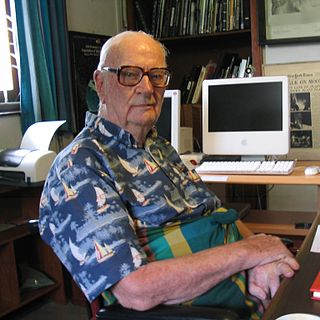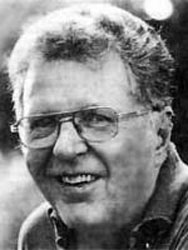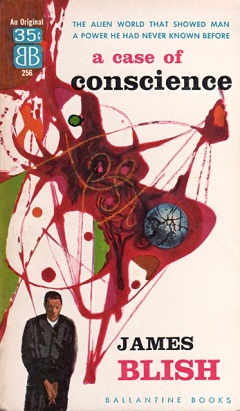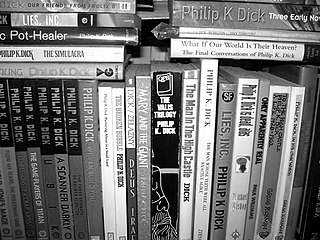Related Research Articles

Hard science fiction is a category of science fiction characterized by concern for scientific accuracy and logic. The term was first used in print in 1957 by P. Schuyler Miller in a review of John W. Campbell's Islands of Space in the November issue of Astounding Science Fiction. The complementary term soft science fiction, formed by analogy to the popular distinction between the "hard" (natural) and "soft" (social) sciences, first appeared in the late 1970s. Though there are examples generally considered as "hard" science fiction such as Isaac Asimov's Foundation series, built on mathematical sociology, science fiction critic Gary Westfahl argues that while neither term is part of a rigorous taxonomy, they are approximate ways of characterizing stories that reviewers and commentators have found useful.

Philip Kindred Dick, often referred to by his initials PKD, was an American science fiction writer and novelist. He wrote 44 novels and about 121 short stories, most of which appeared in science fiction magazines during his lifetime. His fiction explored varied philosophical and social questions such as the nature of reality, perception, human nature, and identity, and commonly featured characters struggling against elements such as alternate realities, illusory environments, monopolistic corporations, drug abuse, authoritarian governments, and altered states of consciousness. He is considered one of the most important figures in 20th-century science fiction.

A Scanner Darkly is a science fiction novel by American writer Philip K. Dick, published in 1977. The semi-autobiographical story is set in a dystopian Orange County, California, in the then-future of June 1994, and includes an extensive portrayal of drug culture and drug use. The novel is one of Dick's best-known works and served as the basis for a 2006 film of the same name, directed by Richard Linklater.

Fredric Brown was an American science fiction, fantasy, and mystery writer. He is known for his use of humor and for his mastery of the "short short" form—stories of one to three pages, often with ingenious plotting devices and surprise endings. Humor and a postmodern outlook carried over into his novels as well. One of his stories, "Arena", was adapted to a 1967 episode of the American television series Star Trek.

Walter Michael Miller Jr. was an American science fiction writer. His fix-up novel, A Canticle for Leibowitz (1959), the only novel published in his lifetime, won the 1961 Hugo Award for Best Novel. Prior to its publication, he was a writer of short stories.

Richard Kingsley Morgan, is a British science fiction and fantasy author of books, short stories, and graphic novels. He is the winner of the Philip K. Dick Award for his 2003 book Altered Carbon, which was adapted into a Netflix series released in 2018. His third book, Market Forces, won the John W. Campbell Award in 2005, while his 2008 work Thirteen garnered him the Arthur C. Clarke Award.

"The Nine Billion Names of God" is a 1953 science fiction short story by British writer Arthur C. Clarke. The story was among the stories selected in 1970 by the Science Fiction Writers of America as one of the best science fiction short stories published before the creation of the Nebula Awards. It was reprinted in The Science Fiction Hall of Fame, Volume One, 1929–1964.

A Case of Conscience is a science fiction novel by American writer James Blish, first published in 1958. It is the story of a Jesuit who investigates an alien race that has no religion yet has a perfect, innate sense of morality, a situation which conflicts with Catholic teaching. The story was originally published as a novella in 1953, and later extended to novel-length, of which the first part is the original novella. The novel is the first part of Blish's thematic After Such Knowledge trilogy and was followed by Doctor Mirabilis and both Black Easter and The Day After Judgment.

Total Recall 2070 is a science fiction television series influenced by the work of Philip K. Dick. It was first broadcast in 1999 on the Canadian television channel CHCH-TV and later the same year on the American Showtime channel. It was later syndicated in the United States with some editing to remove scenes of nudity, violence and strong language.
"Sales Pitch" is a science fiction short story by American writer Philip K. Dick, first published in Future Science Fiction magazine, June 1954. The premise is the omnipresent, intrusive and even aggressive advertising and marketing. At the end of the story, the protagonist is driven mad by a robot who can forcefully market himself, and refuses to take no for an answer. The subject was of concern to Dick, and features in his early works such as The Man Who Japed.
"Roog" is a science fiction short story by American writer Philip K. Dick. It was his first sold work, although not his first published story.

Deus Irae is a post-apocalyptic science fiction novel started by American author Philip K. Dick and finished with the help of American author Roger Zelazny. It was published in 1976. Deus irae, meaning God of Wrath in Latin, is a play on Dies Irae, meaning Day of Wrath or Judgment Day. This novel was based on Dick's short stories "The Great C" and "Planet for Transients".

The bibliography of Philip K. Dick includes 44 novels, 121 short stories, and 14 short story collections published by American science fiction author Philip K. Dick during his lifetime.

"Planet for Transients" is a 1953 science fiction short story by American writer Philip K. Dick. The story was originally published in the October–November 1953 issue of Fantastic Universe. The story also appears in We Can Remember It for You Wholesale . The author's original title for the story was "The Itinerants".

"The Commuter" is a science fiction short story by American writer Philip K. Dick, first published in the August-September 1953 issue of Amazing Stories. It has been reprinted over 20 times, including Croatian, Dutch, French, German and Italian translations. As with much of Dick's fiction, it is an exploration of the boundary of existence.

Typewriter in the Sky is a science fantasy novel by American writer L. Ron Hubbard. The protagonist Mike de Wolf finds himself inside the story of his friend Horace Hackett's book. He must survive conflict on the high seas in the Caribbean during the 17th century, before eventually returning to his native New York City. Each time a significant event occurs to the protagonist in the story he hears the sounds of a typewriter in the sky. At the story's conclusion, de Wolf wonders if he is still a character in someone else's story. The work was first published in a two-part serial format in 1940 in Unknown Fantasy Fiction. It was twice published as a combined book with Hubbard's work Fear. In 1995 Bridge Publications re-released the work along with an audio edition.

Memory of Water is the debut novel by Finnish author Emmi Itäranta, published in 2014 by HarperCollins. The Finnish version of the novel, which Itäranta wrote simultaneously along with the English one, was published in Finland in 2013 by the publishing house Teos. Set in a dystopian future where fresh water is scarce, it tells the story of Noria, a young tea master's apprentice, who must come to terms with a great secret and even greater responsibility that follows this knowledge.
Sarah Pinsker is an American science fiction and fantasy author. She is a nine-time finalist for the Nebula Award, and her debut novel A Song for a New Day won the 2019 Nebula for Best Novel while her story "Our Lady of the Open Road won the 2016 Nebula Award for Best Novelette. Her novelette "Two Truths and a Lie" received both the Nebula Award and the Hugo Award. Her fiction has also won the Philip K. Dick Award, the Theodore Sturgeon Award and been a finalist for the Hugo, World Fantasy, and Tiptree Awards.

"The Impossible Planet" is a science fiction short story by American writer Philip K. Dick, first published in the October 1953 issue of Imagination. It has been reprinted over 30 times, including Brian Aldiss's 1974 Space Odysseys anthology. It was also published in Dutch, French, German and Italian translations. The writer originally submitted it to the Scott Meredith Literary Agency on February 11, 1953, with the title "Legend."

Meg Elison is an American author and feminist essayist whose writings often incorporate the themes of female empowerment, body positivity, and gender flexibility. Her debut novel, The Book of the Unnamed Midwife, won the 2014 Philip K. Dick Award, and her second novel, The Book of Etta, was nominated for the award in 2017. Elison's work has appeared in several markets, including Fantasy & Science Fiction, Terraform, McSweeney's Internet Tendency, Catapult, and Electric Literature.
References
- ↑ "Series: Cosmos Science Fiction and Fantasy Magazine". isfdb.
- ↑ Broderick, Damien, ed. (2010). Skiffy and Mimesis: More Best of ASFR: Australian SF Review. Borgo Press. pp. 56, 59. ISBN 9781434457875 . Retrieved 8 June 2014.
- ↑ "Title: The Great C". www.isfdb.org. Retrieved 2021-03-14.
- ↑ Palmer, Christopher (2003). Philip K. Dick: Exhilaration and Terror of the Postmodern. Liverpool University Press. ISBN 9780853236184 . Retrieved 8 June 2014.
- ↑ Mackey, Douglas A. (1988). Philip K. Dick (Twayne's United States Authors Series). Twayne Publishers. pp. 9, 112. ISBN 9780805775150 . Retrieved 8 June 2014.
- ↑ Rossi, Umberto (2011). The Twisted Worlds of Philip K. Dick: A Reading of Twenty Ontologically Uncertain Novels. Jefferson, North Carolina: McFarland. p. 27. ISBN 978-0-7864-4883-8.
- ↑ Nahin, Paul J. (2014). Holy Sci-Fi!. Springer.
- 1 2 3 Bullard, Benjamin (2018-10-09). "Phillip K. Dick comes to VR with post-apocalyptic 'The Great C'". SYFY WIRE. Retrieved 2021-03-16.
- 1 2 "Philip K. Dick's short story 'The Great C' will become a VR experience". VentureBeat. 2018-07-25. Retrieved 2021-03-16.
- ↑ "'The Great C' hands-on: Adapting a Philip K. Dick short story into cinematic VR". VentureBeat. 2018-08-29. Retrieved 2021-03-16.